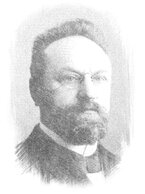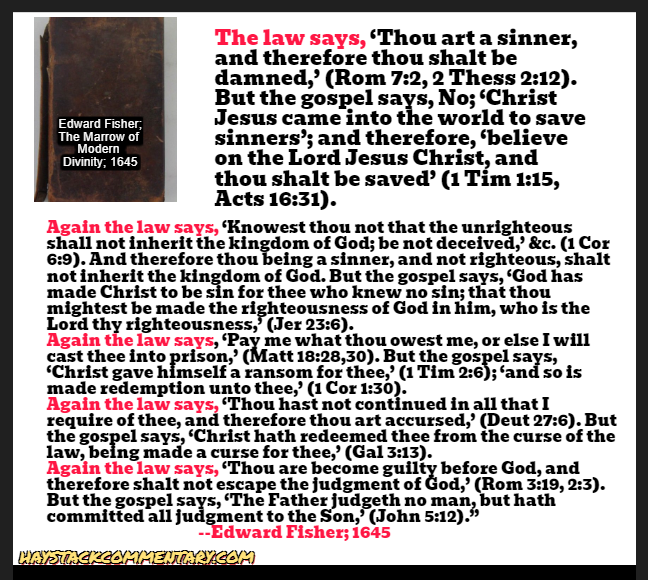Romans 7
|
Romans 7:7-13:
What shall we say then? Is the law sin? Certainly not! On the contrary, I would not have known sin except through the law. For I would not have known covetousness unless the law had said, “You shall not covet.” 8 But sin, taking opportunity by the commandment, produced in me all manner of evil desire. For apart from the law sin was dead. 9 I was alive once without the law, but when the commandment came, sin revived and I died. 10 And the commandment, which was to bring life, I found to bring death. 11 For sin, taking occasion by the commandment, deceived me, and by it killed me. 12 Therefore the law is holy, and the commandment holy and just and good. 13 Has then what is good become death to me? Certainly not! But sin, that it might appear sin, was producing death in me through what is good, so that sin through the commandment might become exceedingly sinful. |

If no one articulated God's holy and awe-inspiring character, then we would not know how to model ourselves after Him. So, God provided the law to help communicate His character to His chosen people who were now out of bondage (Egypt) as they awaited the coming Messiah.
Another way to think about it is that the law turned previously invisible sin visible. The law exposes the present corruption and shines a light on our broken and flawed character! But, at the same time, the law illuminates God's holy and perfect character. The law excites man's innate rebellion (because of the first sin of Adam) by revealing a holy standard, showing us more clearly our need for salvation in Jesus. Too often, Satan inserts his deception into this divine process. We see (#1) our rebellion and (#2) the holy standard of God, but the devil cycles us through his lies of unworthiness, shame, and guilt and we are blinded to the answer of (3) Jesus! #1 and #2 our simply the addition needed to get us to #3; they are not the answer. Only Jesus. -Divinely Interrupted |
|
Romans 7:14-25:
For we know that the law is spiritual, but I am carnal, sold under sin. 15 For what I am doing, I do not understand. For what I will to do, that I do not practice; but what I hate, that I do. 16 If, then, I do what I will not to do, I agree with the law that it is good. 17 But now, it is no longer I who do it, but sin that dwells in me. 18 For I know that in me (that is, in my flesh) nothing good dwells; for to will is present with me, but how to perform what is good I do not find. 19 For the good that I will to do, I do not do; but the evil I will not to do, that I practice. 20 Now if I do what I will not to do, it is no longer I who do it, but sin that dwells in me. 21 I find then a law, that evil is present with me, the one who wills to do good. 22 For I delight in the law of God according to the inward man. 23 But I see another law in my members, warring against the law of my mind, and bringing me into captivity to the law of sin which is in my members. 24 O wretched man that I am! Who will deliver me from this body of death? 25 I thank God—through Jesus Christ our Lord! |
In verses 14-25, “I” is used twenty-four times, and when you add the times Paul uses “me,” “my,” or “myself,” it is another thirteen times. That comes to a total of thirty-seven times in these twelve verses that the apostle refers to himself in this one passage
An antithesis to being “spiritual,” Paul was “carnal.” When the Bible speaks of the unregenerate man, it calls him “soulish”; he is simply body, mind, emotions, and will. That is man as in the old Adam, that which is subject to sin and death. This is an inheritance that we receive from the epoch of Adam. However, when the Word speaks of the believer’s Adamic nature, it refers to him as “carnal” (sarkinos) or fleshly. “Fleshly” is not the physical body but the fallen aspect of Adam that remains with the believer after becoming a Christian—his sin capacity. This is when the believer lives as a non-Christian.
There is a sense that the individual Christian belongs to both the epoch of Adam and the epoch of Christ. The epoch of Adam is represented as the sin capacity and the epoch of Christ is represented as newness of life. Carnality here speaks of someone under the control of his corrupt sin capacity. The carnal or fleshly man is dominated by the old capacity from Adam. This is not our physical flesh but the nature of fallen Adam or sin capacity. Paul was describing his condition after becoming a Christian. It is important for the believer to recognize the reality of this condition. The strongest Christian on earth is not free from the influence of his sin capacity. [SOURCE: Verse By Verse Commentary] Romans 7:14-25 is one of the most debated passages in the Bible. There are three major positions that have vied for interpretational prominence over the years. One view sees Paul’s description of his struggle with sin as his pre-conversion experience. The other sees Paul’s description as his post-conversion experience. A third — articulated by Martyn Lloyd-Jones — argues that we ask the wrong question if we inquire about Paul’s spiritual status in Romans 7:14-25. Rather, as the Doctor asserts, Paul is explaining what happens when someone pursues sanctification according to the law rather than by the Spirit. -Derek J Brown |
 Herman Bavinck
Herman Bavinck
“The Gospel is temporary, but the law is eternal and is restored precisely through the Gospel. Freedom from the law consists, then, not in the fact that the Christian has nothing more to do with the law, but lies in the fact that the law demands nothing more from the Christian as a condition of salvation. The law can no longer judge and condemn him. Instead he delights in the law of God according to the inner man and yearns for it day and night.”
― Herman Bavinck
 Stephen Unthank
Stephen Unthank
John Owen, in his detailed study of indwelling sin, describes the flesh as an “inbred law [that] must needs be effectual... such is the law of sin. It is an indwelling law: ‘It is sin that dwells in me’ (Rom. 7:17, 20); ‘It is present with me’ (Rom. 7:21); ‘It is in my members’ (Rom. 7:23) – yea, it is so far in man, as in some sense it is said to be man himself; ‘I know that in me (that is, in my flesh) dwells no good thing’ (Rom. 7:18). The flesh, which is the seat and throne of this law, yea, which indeed is this law, is in some sense the man himself... an indwelling law inclining and moving to sin as an inward habit or principle.” The flesh then is Paul’s word to describe the state of every fallen human being as sinfully self-centered and dominated by rebellion. “The works of the flesh are evident,” says the Apostle Paul. They are “sexual immorality, impurity, sensuality, idolatry, sorcery, enmity, strife, jealousy, fits of anger, rivalries, dissensions, divisions, envy, drunkenness, orgies, and things like these. I warn you, as I warned you before, that those who do such things will not inherit the kingdom of God” (Galatians 5:19-21). --Stephen Unthank; Greenbelt Baptist Church

Our broken flesh is part of the corrupt system dominated by Satan. It doesn’t mean we are actually possessed, but that our bodies are fundamentally operating under that sick, sinful system. This is true for believers as well as unbelievers. All malfunctions of the body steal God’s gift of life and turn it into an instrument of death. In addiction, the body is under the influence of its own broken condition. Without a spiritual remedy, this reality is dim for the addict. However, as Christians we have access to the Holy Spirit. As we’ll learn later, the addict— and all Christians—will need to be conquered by the Holy Spirit. But there is another power within me that is at war with my mind. This power makes me a slave to the sin that is still within me. Oh, what a miserable person I am! Who will free me from this life that is dominated by sin and death? (Romans 7: 23-24).
|
Romans 7:26-32:
26 Because of this, God gave them over to shameful lusts. Even their women exchanged natural sexual relations for unnatural ones. 27 In the same way the men also abandoned natural relations with women and were inflamed with lust for one another. Men committed shameful acts with other men, and received in themselves the due penalty for their error. 28 Furthermore, just as they did not think it worthwhile to retain the knowledge of God, so God gave them over to a depraved mind, so that they do what ought not to be done. 29 They have become filled with every kind of wickedness, evil, greed and depravity. They are full of envy, murder, strife, deceit and malice. They are gossips, 30 slanderers, God-haters, insolent, arrogant and boastful; they invent ways of doing evil; they disobey their parents; 31 they have no understanding, no fidelity, no love, no mercy. 32 Although they know God’s righteous decree that those who do such things deserve death, they not only continue to do these very things but also approve of those who practice them. |
|











